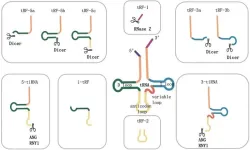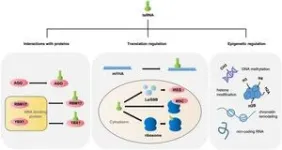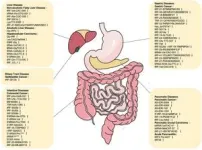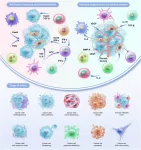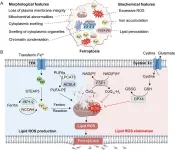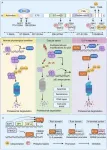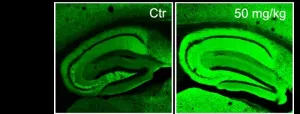(Press-News.org)
This new article published in Genes & Diseases highlights the critical role of tRNA-derived small RNAs (tsRNAs) in digestive tract diseases, positioning these molecules as potential biomarkers for diagnosis, prognosis, and targeted therapies. The comprehensive review explores the biogenesis, classification, and biological functions of tsRNAs, shedding light on their influence over cellular processes such as translation regulation, epigenetic modification, and protein interactions.
Recent findings emphasize the significance of tsRNAs in both tumor and non-tumor digestive diseases, demonstrating their ability to regulate cell proliferation, apoptosis, migration, and immune responses. The molecular mechanisms behind these functions suggest a close association between tsRNA expression profiles and various gastrointestinal conditions, including gastric cancer, colorectal cancer, liver disease, biliary tract disorders, and pancreatic disease. By modulating crucial signaling pathways, tsRNAs could serve as early diagnostic markers and therapeutic targets, transforming current approaches to digestive health.
One of the most compelling aspects of the research is the potential application of tsRNA-based interventions. By leveraging tsRNA-targeted drugs, scientists have successfully altered disease phenotypes in preclinical models, paving the way for new therapeutic strategies. These findings hold promise for the development of personalized medicine, where tsRNA expression levels could guide treatment decisions and patient monitoring.
The widespread presence and high conservation of tsRNAs in digestive tract diseases underscore their clinical value. Researchers have identified specific tsRNA molecules with predictive capabilities, enabling more precise disease monitoring. Advances in sequencing technology have further enhanced the ability to detect tsRNA expression patterns, improving diagnostic accuracy and offering novel insights into disease mechanisms.
The implications of these discoveries extend beyond the realm of diagnostics. As tsRNA-targeted therapies continue to evolve, their integration into clinical practice could revolutionize the management of digestive diseases. The potential for combining tsRNA-based treatments with existing therapies presents exciting new avenues for improving patient outcomes and enhancing precision medicine approaches.
This emerging field holds transformative potential, promising to refine disease detection, improve therapeutic efficacy, and expand our understanding of RNA-based regulation in digestive tract disorders. With continued research and technological advancements, tsRNAs may soon become a cornerstone in the fight against digestive tract diseases.
# # # # #
Genes & Diseases publishes rigorously peer-reviewed and high quality original articles and authoritative reviews that focus on the molecular bases of human diseases. Emphasis is placed on hypothesis-driven, mechanistic studies relevant to pathogenesis and/or experimental therapeutics of human diseases. The journal has worldwide authorship, and a broad scope in basic and translational biomedical research of molecular biology, molecular genetics, and cell biology, including but not limited to cell proliferation and apoptosis, signal transduction, stem cell biology, developmental biology, gene regulation and epigenetics, cancer biology, immunity and infection, neuroscience, disease-specific animal models, gene and cell-based therapies, and regenerative medicine.
Scopus CiteScore: 7.3
Impact Factor: 6.9
# # # # # #
More information: https://www.keaipublishing.com/en/journals/genes-and-diseases/
Editorial Board: https://www.keaipublishing.com/en/journals/genes-and-diseases/editorial-board/
All issues and articles in press are available online in ScienceDirect (https://www.sciencedirect.com/journal/genes-and-diseases ).
Submissions to Genes & Disease may be made using Editorial Manager (https://www.editorialmanager.com/gendis/default.aspx ).
Print ISSN: 2352-4820
eISSN: 2352-3042
CN: 50-1221/R
Contact Us: editor@genesndiseases.com
X (formerly Twitter): @GenesNDiseases (https://x.com/GenesNDiseases )
# # # # # #
Reference
Mingrui Liu, Xiaojun Zhuang, Haiqing Zhang, Weidong Ji, Gang Yuan, tRNA-derived small RNAs in digestive tract diseases: Progress and perspectives, Genes & Diseases, Volume 12, Issue 3, 2025, 101326, https://doi.org/10.1016/j.gendis.2024.101326
END
Does triggering certain emotions increase willingness to pay for sustainably produced food? In social media, emotional messages are often used to influence users' consumer behaviour. An international research team including the University of Göttingen investigated the short- and medium-term effects of such content on consumers' willingness to pay for bars of chocolate. They found that in the short term, provoking certain emotions increases willingness to pay, but the effect weakens after a very short time. The results were published in the journal Q Open.
Food ...
Prostate cancer statistics can look scary: 34,250 U.S. deaths in 2024. 1.4 million new cases worldwide in 2022.
Dr. Bruce Montgomery, a UW Medicine oncologist, hopes that patients won’t see these numbers and just throw up their hands in fear or resignation.
“Being diagnosed with prostate cancer is not a death knell,” said Montgomery, senior author of a literature and trial review that appeared in JAMA today. Montgomery is the clinical director of Genitourinary Oncology at Fred Hutch Cancer ...
A new review article published in Genes & Diseases sheds light on the complex molecular mechanisms through which tumor-infiltrating immune cells regulate endometrial carcinoma (EC). As one of the most prevalent gynecological cancers, EC continues to challenge researchers and clinicians due to its dynamic interaction with the immune microenvironment. This comprehensive review presents crucial insights into how immune cells influence tumor progression and how immune evasion strategies enable cancer cells to thrive.
The tumor microenvironment ...
Innovative insights into the role of ferroptosis, a unique form of programmed cell death, are reshaping the landscape of disease treatment. This growing field highlights how Traditional Chinese Medicine (TCM) can effectively modulate ferroptosis, offering novel therapeutic approaches for various conditions, including cancer, cardiovascular diseases, neurodegenerative disorders, and organ injuries. The powerful bioactive compounds in TCM have demonstrated the ability to regulate iron metabolism, lipid peroxidation, and redox balance, positioning them as key players in advancing modern medicine.
With its rich history of holistic ...
MSU has a satellite uplink/LTN TV studio and Comrex line for radio interviews upon request.
EAST LANSING, Mich. – A team of researchers at Michigan State University and the University of Michigan found new insights on the timing of prenatal stress and its effect on infant stress reactivity and temperament — including differences between genders.
The study, published in Psychoneuroendocrinology, is the first to examine weekly stress across 27 weeks of pregnancy to pinpoint when it most affects a newborn’s stress response and temperament — two measures that indicate infant biobehavioral reactivity.
“Prenatal ...
Kayunta Johnson-Winters, an associate professor of chemistry and biochemistry at The University of Texas at Arlington, has been named a 2025 fellow of the American Society for Biochemistry and Molecular Biology.
The honor recognition recognizes her contributions to biochemistry and molecular biology and her efforts to support junior faculty, women in science and student mentorship.
“This is a tremendous honor and recognizes Kay’s important work in advancing our understanding of disease while mentoring junior faculty and student researchers,” said Morteza Khaledi, dean of UTA’s College of Science. “I’m pleased ...
ELF4, a transcription factor belonging to the ETS family, has emerged as a pivotal regulator in cell differentiation, immune system function, and cancer progression. This newly published review underscores its molecular complexity and clinical significance, shedding light on its dual role in tumor suppression and oncogenesis.
ELF4 is highly expressed in various tissues, including hematopoietic cells, placenta, and the gastrointestinal tract. Its activity is tightly controlled through post-translational modifications and intricate signaling pathways, allowing it to modulate key physiological processes. Notably, ELF4 plays a critical ...
Embargoed for release until 5:00 p.m. ET on Monday 10 March 2025
Follow @Annalsofim on X, Facebook, Instagram, threads, and Linkedin
Below please find summaries of new articles that will be published in the next issue of Annals of Internal Medicine. The summaries are not intended to substitute for the full articles as a source of information. This information is under strict embargo and by taking it into possession, media representatives are committing to the terms of the embargo not only on their own behalf, but also on behalf of the organization they represent.
----------------------------
1. ...
In today’s economy, many workers have transitioned from manual labor toward knowledge work, a move driven primarily by technological advances, and workers in this domain face challenges around managing non-routine work, which is inherently uncertain. Automated interventions can help workers understand their work and boost performance and trust. In a new study, researchers explored how artificial intelligence (AI) can enhance performance and trust in knowledge work environments. They found that when AI systems provided feedback in real-time, performance and trust increased.
The study, by researchers at Carnegie Mellon ...
LA JOLLA, CA—The herb rosemary has long been linked with memory: “There’s rosemary, that’s for remembrance,” says Ophelia in Shakespeare’s Hamlet. So it is fitting that researchers would study a compound found in rosemary and sage—carnosic acid—for its impact on Alzheimer’s disease. In the disease, which is the leading cause of dementia and the sixth leading cause of death in the US, inflammation is one component that often leads to cognitive decline.
Carnosic acid is an antioxidant and anti-inflammatory compound that works by activating enzymes that make up the body’s natural defense system. ...
